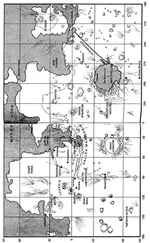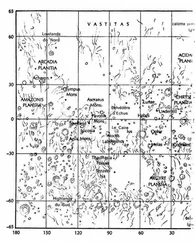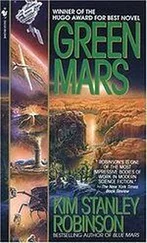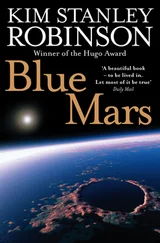Kim Robinson - Blue Mars
Здесь есть возможность читать онлайн «Kim Robinson - Blue Mars» — ознакомительный отрывок электронной книги совершенно бесплатно, а после прочтения отрывка купить полную версию. В некоторых случаях можно слушать аудио, скачать через торрент в формате fb2 и присутствует краткое содержание. Год выпуска: 1996, ISBN: 1996, Издательство: Spectra/Bantam Dell/Random House, Жанр: Космическая фантастика, на английском языке. Описание произведения, (предисловие) а так же отзывы посетителей доступны на портале библиотеки ЛибКат.
- Название:Blue Mars
- Автор:
- Издательство:Spectra/Bantam Dell/Random House
- Жанр:
- Год:1996
- ISBN:0-553-10144-7
- Рейтинг книги:3 / 5. Голосов: 1
-
Избранное:Добавить в избранное
- Отзывы:
-
Ваша оценка:
- 60
- 1
- 2
- 3
- 4
- 5
Blue Mars: краткое содержание, описание и аннотация
Предлагаем к чтению аннотацию, описание, краткое содержание или предисловие (зависит от того, что написал сам автор книги «Blue Mars»). Если вы не нашли необходимую информацию о книге — напишите в комментариях, мы постараемся отыскать её.
Green Mars
The Martian Chronicles
Dune
Piblishers Weekly st
Blue Mars — читать онлайн ознакомительный отрывок
Ниже представлен текст книги, разбитый по страницам. Система сохранения места последней прочитанной страницы, позволяет с удобством читать онлайн бесплатно книгу «Blue Mars», без необходимости каждый раз заново искать на чём Вы остановились. Поставьте закладку, и сможете в любой момент перейти на страницу, на которой закончили чтение.
Интервал:
Закладка:
He headed north, toward the sea. Some of his best thinking about memory had come when he was walking down to this seashore, over routes so circuitous that he could never find the same way twice, partly because the old lava plateau was so fractured by grabens and scarps, partly because he was never paying attention to the larger topography — he was either lost in his thoughts or lost in the immediate landscape, only intermittently looking around to see where he was. In fact it was a region in which one could not get lost; ascend any small ridge, and there the Acheron fin stood, like the spine of an immense dragon; and in the other direction, visible from more places as one approached it, the wide blue expanse of Acheron Bay. In between lay a million micro-environments, the rocky plateau pocked with hidden oases, and every crack filled with plants. It was very unlike the melting landscape on the polar shore across the sea; this rocky plateau and its little hidden habitats seemed immemorial, despite the gardening that was certainly being done by the Acheron ecopoets. Many of these oases were experiments, and Sax treated them as such, staying out of them, peering down into one steep-walled alas after another, wondering what the ecopoet responsible was trying to discover with his or her work. Here soil could be spread with no fear of it being washed into the sea, although the startling green of the estuaries extending back into the valleys showed that some fertile soil was making its way down the streams. These estuarine marshes would fill with eroded soils, while at the same time they were getting saltier, along with the North Sea itself…
This time out, however, his observations were broken repeatedly by thoughts of John. John Boone had worked for him for the last several years of John’s life, and they had had many a conference as they discussed the rapidly developing Martian situation; vital years; and through them John had been always happy, cheerful, confident — trustworthy loyal helpful friendly courteous kind obedient cheerful thrifty brave clean and reverent — no, no, not exactly — he had also been abrupt, impatient, arrogant, lazy, slipshod, drug dependent, proud. But how Sax had come to rely on him, how he had loved him — loved him like a big brother who had protected him out in the world at large. And then they had killed him. Those are the ones the killers always go after. They can’t stand that courage. And so they had killed him and Sax had stood on watching and hadn’t done a thing. Frozen in shock and personal fear. You didn’t stop them? Maya had cried; he remembered it now, her sharp voice. No, I was afraid. No, I did nothing. Of course it was unlikely that there was anything he could have done at that point. Before, when the attacks on John had first started, Sax might have been able to talk him into another assignment, gotten him some bodyguards, or, since John would never have accepted that, hired some bodyguards to follow him in secret, to protect him while his friends froze and stared in shocked witness. But he hadn’t hired anyone. And so his brother had been killed, his brother who had laughed at him but who had loved him as well, loved him before anyone else thought of him at all.
Sax wandered over the fractured plain, distraught — distraught at the loss of a friend 153 years before. Sometimes it seemed there was no such thing as time.
Then he stopped short, brought back to the present by the sight of life. Small white rodents, sni’ffing around on the green of a sunken meadow. They were no doubt snow pika or something like, but in their whiteness they looked enough like lab rats to give Sax a start. White lab rats, yes, but tailless — mutant lab rats, yes — free at last, out of their cages and into the world, wandering over the intense green meadow grass like surreal hallucinatory objects, all ablink and sniff-whiskered as they checked out the ground between grass clumps for tasties. Munching away on seeds and nuts and flowers. John had been greatly amused at the myth of Sax as the hundred lab rats. Sax’s mind, now free and scattered. This is our body.
He crouched and watched the little rodents until he got cold. There were greater creatures out on that plain, and they always stopped him short: deer, elk, moose, bighorn sheep, reindeer, caribou, black bear, grizzly bear — even packs of wolves, like swift gray shadows — and all to Sax like citizens out of a dream, so that every time he spotted even a single creature he felt startled, disconnected, even stunned; it did not seem possible; it was certainly not natural. Yet here they were. And now these little snow pika, happy in their oasis. Not nature, not culture: just Mars.
He thought of Ann. He wanted her to see them.
He often thought of her these days. So many of his friends were dead now, but Ann was alive, he could still talk to her, it was at least possible. He had looked into the matter, and found that she now lived in the caldera of Olympus Mons, as part of the small community of red climbers that occupied it. Apparently they took turns in the caldera, to keep the population low despite the big holes’ steep walls and primeval conditions, both so attractive to them. But Ann stayed as long as she liked, Sax had heard, and only left infrequently. This was what Peter had told him, although Peter had only heard it secondhand. Sad how those two were estranged; pointless; but family estrangements seemed to be the most intransigent of all.
Anyway, she was on Olympus Mons. Therefore almost in sight, just over the horizon to the south. And he wanted to talk to her. All his reflections on what happened to Mars, he thought, were framed as an internal conversation with Ann. Not so much as an argument, or so he hoped, but as an endless persuasion. If he could be so changed by the reality of blue Mars, could not Ann as well? Was it not almost inevitable, even necessary? Might it have already happened? Sax felt he had come over the years to love what Ann loved in Mars; and now he wanted her to reciprocate, if possible. She had become for him, in a most uncomfortable way, his measure of the worth of what they had done. The worth, or the acceptability. It was a strange feeling to have settled in him, but there it was.
Another uncomfortable lump in his mind, like the suddenly rediscovered guilt about John’s death, which he would try again to forget. If he could blank out on the interesting thoughts he ought to be able to blank out on the awful ones, oughtn’t he? John had died, and nothing Sax could have done would have prevented it. Very probably. There was no way to say. And no way to go back. John had been killed and Sax had failed to help him; and here they were, Sax alive and John dead, nothing now but a powerful node-and-network system in the minds of all the people who had known him. And nothing to be done.
But Ann was alive, up there climbing the caldera walls of Olympus. He could talk to her if he wanted. Although she would not come out. He would have to hunt her down. But he could do it, that was the thing. The real sting of John’s death lay in the death of that chance; he could no longer talk to him. But he could still talk to Ann, the chance existed.
Work on the anamnestic package continued. Acheron was a joy that way: days in the labs, talking with the lab directors about their experiments and seeing if he could help. Weekly seminars, where they got together in front of the screens and shared their.results, and talked about what they meant and what they might try next. People interrupted their work to help with the farm, or do other business or go on trips; but others were there to fill in, and when people came back they often had new ideas, and always had a new charge of energy. Sax sat in the seminar rooms after the weekly roundups, looking at the coffee cups and the rings of brown coffee and black kava stains on the battered wooden tabletops, the white shiny blackboard screens covered with schemata and chemical diagrams and big looping arrows pointing to acronyms and alchemical symbols that Michel would have loved, and something inside him would glow till it hurt, some parasympathetic reaction spilling out of his limbic system — now this was science, by God, this was Martian science, in the hands of the scientists themselves, working together for some collective goal that made sense, that was for the common good; pushing at the edge of what they knew, theory and experiment bouncing back and forth like a blur of Ping-Pong balls, week after week finding out more, going after more, extending the great invisible parthenon right out into the uncharted territory of the human mind, into life itself. It made him so happy that he almost didn’t care if they ever figured things out; the search was all.
Читать дальшеИнтервал:
Закладка:
Похожие книги на «Blue Mars»
Представляем Вашему вниманию похожие книги на «Blue Mars» списком для выбора. Мы отобрали схожую по названию и смыслу литературу в надежде предоставить читателям больше вариантов отыскать новые, интересные, ещё непрочитанные произведения.
Обсуждение, отзывы о книге «Blue Mars» и просто собственные мнения читателей. Оставьте ваши комментарии, напишите, что Вы думаете о произведении, его смысле или главных героях. Укажите что конкретно понравилось, а что нет, и почему Вы так считаете.












